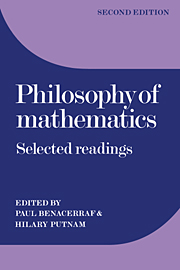Book contents
- Frontmatter
- Contents
- Preface to the second edition
- Introduction
- Part I The foundations of mathematics
- Part II The existence of mathematical objects
- Part III Mathematical truth
- The a priori
- Truth by convention
- Carnap and logical truth
- On the nature of mathematical truth
- On the nature of mathematical reasoning
- Mathematical truth
- Models and reality
- Part IV The concept of set
- Bibliography
On the nature of mathematical reasoning
Published online by Cambridge University Press: 05 June 2012
- Frontmatter
- Contents
- Preface to the second edition
- Introduction
- Part I The foundations of mathematics
- Part II The existence of mathematical objects
- Part III Mathematical truth
- The a priori
- Truth by convention
- Carnap and logical truth
- On the nature of mathematical truth
- On the nature of mathematical reasoning
- Mathematical truth
- Models and reality
- Part IV The concept of set
- Bibliography
Summary
The very possibility of mathematical science seems an insoluble contradiction. If this science is only deductive in appearance, from whence is derived that perfect rigour which is challenged by none? If, on the contrary, all the propositions which it enunciates may be derived in order by the rules of formal logic, how is it that mathematics is not reduced to a gigantic tautology? The syllogism can teach us nothing essentially new, and if everything must spring from the principle of identity, then everything should be capable of being reduced to that principle. Are we then to admit that the enunciations of all the theorems with which so many volumes are filled are only indirect ways of saying that A is A?
No doubt we may refer back to axioms which are at the source of all these reasonings. If it is felt that they cannot be reduced to the principle of contradiction, if we decline to see in them any more than experimental facts which have no part or lot in mathematical necessity, there is still one resource left to us: we may class them among a priori synthetic views. But this is no solution of the difficulty – it is merely giving it a name; and even if the nature of the synthetic views had no longer for us any mystery, the contradiction would not have disappeared; it would have only been shirked.
- Type
- Chapter
- Information
- Philosophy of MathematicsSelected Readings, pp. 394 - 402Publisher: Cambridge University PressPrint publication year: 1984

